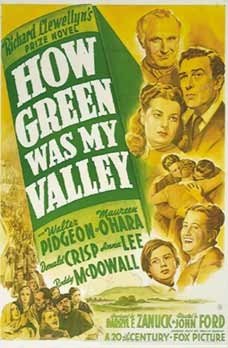
HOW GREEN WAS MY VALLEY
US, 1941, 118 minutes, Black and white.
Maureen O ’Hara, Walter Pidgeon, Donald Crisp, Roddy M cDowell, Anna Lee, John Loder, Sara Allgood, Barry Fitzgerald, Arthur Shields, Patric Knowles.
Directed by John Ford.
How Green Was My Valley is a fine film, a film of great wisdom and beauty. It won the Academy Award as Best Picture of 1941. The novel by Richard Llewellyn was widely read during the 1930s. It caught the spirit of the times, especially the 1930s with the Depression, social change and industrial change, the need for unions for individual rights. This is all pictured in flashback to the early 1900s, the coal mines of Wales, the opening up of the mines when the valley was still green.
The film is also about family, with the patriarch set in his ways and his sons trying to effect change, especially for the miners. The story is told by the youngest son, now grown up, but an observer of everything, including the work of his self-sacrificing school teacher and his attraction towards his sister. The film was directed by that great director of westerns, John Ford, and starred Maureen O’ Hara as the sister, Walter Pidgeon as the teacher and a young Roddy Mc Dowell as the little boy. Donald Crisp won the Best Supporting Oscar for his performance as the father. This is a fine and humane film.
1. The nostalgia and feeling in the title? A picture of the past as seen from the present? This atmosphere for the film?
2. The role and influence of memory, the memory of youth, the real and the ideal? The importance and reality of growing up?
3. The structure of the film and its impact: the memories of Hugh, the memories coloured by the past, the judgments of the present? the quality of the black and white photography, the role of the
music, the Welsh musical background?
4. How well did the film communicate this Welsh world? The studio sets, the visualising of mines, the town, its atmosphere, the people, the work, family life, school, the church?
5. How was Hugh the centre of the film? A young boy in this particular world? Not contaminated by the views and the struggles? Hugh’s outlook on this at the time, from the vantage point of memory? His immersion in the place of his family and its work? Life unfolding before him and its mystery?
6. The portrayal of men? their work, its hardness, relentlessness, the dirt in the mine, the hold of tradition, the enjoyment of the choir and singing before the Queen, the deadly reality of the strikes, the suffering, hunger and cold, the role of the father in a family, the brothers leaving home, the marrying and migrating? How good an insight into the plight of working men in the 19th century did the film give?
7. The importance of the father: as a patriarch, his hold over his sons, his standards, unwillingness to change, disappointment in the changes of the times, in his sons? The way he played his father-figure role in the family? Insight into this patriarchal kind of figure?
8. The role of the mother in the family, tough, giving up the wages,
putting herself down with her humorous remarks, her love, relationship to Bronwyn, facing deaths and illness, as a mother-figure? An insight into the 19th century mother?
9. Angharad? Portrayal of her at home, a girl in such a family, in love with the minister, her chatter at home, her work, the rejection by Mr Griffith, the unhappy marriage and her motives for going into it, living the life of a lady of the 19th century, unhappiness and divorce? Insight into the unhappiness of 19th century lives?
10. How attractive a character was Mr Griffith? As a churchman, as a man, his integrity in helping others, his love for Angharad and yet his not being able to marry her? His influence in the town?
As a victim of the town, he could have been happy, why wasn't he? His help to Hugh and the influence in his life?
11. The importance and quality of various sequences: life at home, meals, reading, Hugh's going to school, the sarcastic teacher, the fight with the boys, the miners' strike talks, Hugh's illness, the visit to Bronwyn, walks with Mr Griffith How were these all formative of Hugh?
12. The portrayal of work in the film, the work itself, dangers, strikes and discussions, the need for the unions, the discharging of men, the meetings, and the mother addressing them, the snow and its consequences? Who was responsible for such suffering?
13. The film's portrayal of religion, religious families, life in the chapel, the deacon, the accusation and condemnation of the girl, the way that this was filmed, Angharad'a response, and then being the victim of the same antagonism? Religion as fear and superstition? Mr Griffith's final sermon and condemnation?
14. The roles of accidents, death, and the effect of death on the town and families?
15. The portrayal of families, marriage, love, divorce? True feelings and arranged feelings?
16. What was the quality of life as portrayed in this film? The achievement in life by ordinary people such as these Welsh mining people?